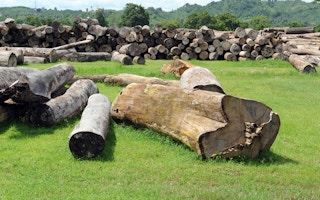Myanmar has embarked on an unprecedented campaign of land and forest clearance driven by concessions for large-scale, private agribusiness projects, mostly in contested border territories close to China and Thailand, according to a report released on March 12.
Forest Trends, a Washington-based non-profit organisation, said its two-year study revealed that the government had allocated at least 5.2 million acres and identified another 11 million acres of some of Southeast Asia’s last remaining “bio-diversity rich high value forests” as suitable for clear-cutting, although the agribusiness projects often never materialised after the timber was removed.
“Many of these forest areas overlap with historical land claims made by Myanmar’s ethnic minority groups who could permanently lose their land, further enflaming decades-old armed conflicts with the national government,” the report said.
“As local communities lose land, wildlife habitat is destroyed and carbon emissions increase, while elite businessmen with strong connections to military-state officials profit.”
“
As Myanmar opens to global markets and concessions for global food production are on the rise, agribusiness has become the primary driver of deforestation in Myanmar.
Michael Jenkins, Forest Trends president
Two case studies focused on Kachin State bordering China, where forests are making way for rubber and biofuel plantations, and Tanintharyi Region near Thailand, where biodiverse forests are being cleared for oil-palm and rubber. Military-backed “crony” businesses that acquired the concessions are named, while in Kachin State, paramilitary and non-state groups and Chinese enterprises have also benefited.
The two regions account for nearly 3.3 million acres, or 60 per cent, of Myanmar’s total concession area. But as of 2013 agricultural crops were planted in only 15pc of the area, the lowest rate in the country.
Forest Trends said the 170pc increase in the amount of land slated for agribusiness – much of it under forest cover – since president U Thein Sein’s government took over in 2011 contradicted official statements purporting to protect remaining forests and land rights.
“As Myanmar opens to global markets and concessions for global food production are on the rise, agribusiness has become the primary driver of deforestation in Myanmar,” said Michael Jenkins, Forest Trends president.
“Claims that agribusiness ventures bring employment and economic development to local communities are left as hollow promises when villagers’ farming fields and forests are confiscated. Seventy-five per cent of these cleared lands – nearly 4 million acres – are still not planted, and concessions do not follow any kind of regulation to protect the environment or local communities from negative impact,” said report author Kevin Woods.
Forest Trends said timber clear-cut from concessions was fuelling exports of wood products that jumped from US$1 billion to about $1.6 billion between 2011 and 2013.
Timber producers and traders are gearing up to export high-value timber, such as Myanmar teak, to European and North American markets following the lifting of Western sanctions. Forest Trends notes that these markets are governed by legislation prohibiting the import of wood products that are illegally harvested and traded, but that “the legality of timber harvested from the cleared lands is questionable and difficult to verify”.
Forest Trends said in total that Myanmar was losing more than 1.15 million acres of forests a year, some of them the region’s last remaining sub-tropical high conservation value forests.
“Farmer-led protests – many of which are violent – are growing in number and strength across the country, challenging the new government’s political legitimacy and more liberal economic model of development. Thousands of past and recent land concessions are now being challenged by forcibly evicted communities across the country,” the report said.
“Local [Kachin] populations who have been forcibly displaced from their upland swidden agro-forestry lands for the Chinese agricultural estates are further contributing to poverty, drugs production and trade, and social and political conflict,” the report said, noting that the largest agribusiness concession, Yuzana Company, was located in and along the world’s largest tiger reserve in western Kachin State.
Palm concessions in Tanintharyi Region were owned by about 40 Myanmar businesses with strong ties to political and military leaders, the Ministry of Industry, and Myanmar Economic Holdings Ltd, a military conglomerate, the report said. Many are on lands formerly inhabited by ethnic Lauom populations who were forcibly evicted.
The growth of agribusiness has led to an institutional conflict between the Ministry of Environmental Conservation and Forestry and the Ministry of Agriculture and Irrigation as they compete for different uses of forestlands, with the latter rising in prestige and power in its push for industrial agricultural expansion, the report said.
U Tin Ko Ko, an environmental activist and member of the Extractive Industries Transparency Initiative, told The Myanmar Times that deforestation in Tanintharyi – designated a global biodiversity hotspot – was spreading.
“You might see green on the mountain, but almost all old trees have gone,” he said. Agribusiness concessions had also been given to three companies from China, Malaysia and Thailand, he said.
But U Aung Min Thu, manager of Myanmar Stark Prestige Plantation, said that they had no permission for logging, only for growing oil-palm. But he said the companies had cut trees for workers’ houses and to clear land for planting. The government had given a concession for 40,000 acres of which 25,000 would be planted, he said.
As The Myanmar Times reported earlier this month, locals have complained that they had received no compensation for their lands that had become part of the plantation.

















